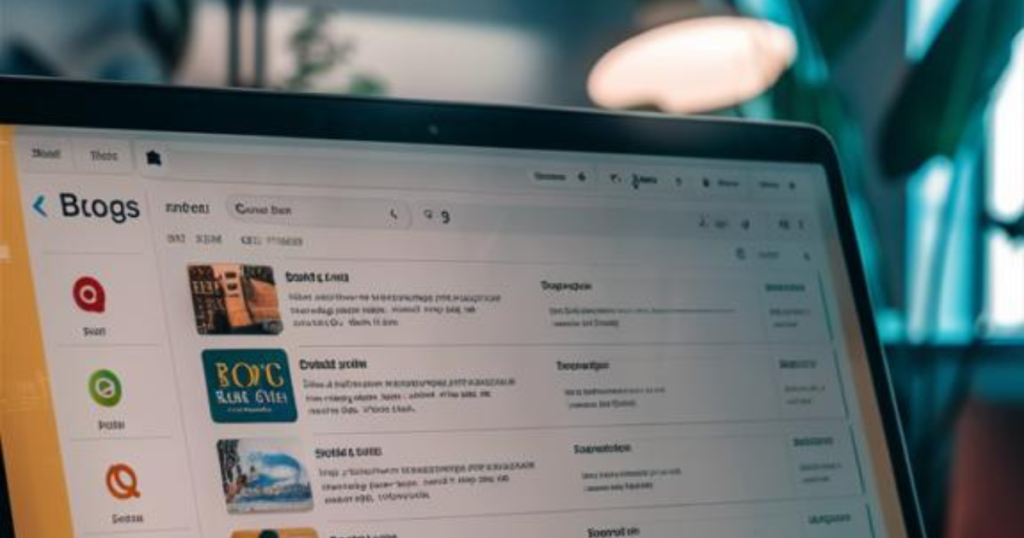Table of Contents
Introduction
Blogging has grown to be a distinguished medium for sharing information, opinions, and knowledge. Originating from the period “weblog,” a blog serves as a virtual diary or journal. An individual or a group of authors can preserve blogs, often updated with new content material called posts.
Key Components of a Blog
Title: Each submission starts evolving with an identity, summarizing the content, and attracting readers.
- Content: The principal frame of the put up, can also consist of textual content, pix, motion pictures, and hyperlinks.
- Comments: A section where readers can leave feedback or interact in communication.
- Archives: A chronological list of preceding posts for easy navigation.
- Categories/Tags: Organizational equipment to organization-associated posts, helping user experience.
Purpose of Blogging

It serves numerous functions:
- Personal: An outlet for self-expression, often reflecting the writer’s interests and opinions.
- Professional: Establishing thought leadership and knowledge within a specific area.
- Business: Building emblem attention, enticing customers, and using visitors to a business enterprise’s website.
- Educational: Sharing know-how, tutorials, and resources.
- News and Updates: Providing timely data on specific topics or domain names.
Blogging Platforms

There are multiple structures in which you’ll create and control a weblog. Some famous alternatives include:
- WordPress: Known for its flexibility and great plugin atmosphere.
- Blogger: A person-pleasant choice furnished with the aid of Google.
- Medium: Focuses on fine writing and an integrated audience.
Blogging Strategies
Successful running a blog regularly calls for a strategic method:
- Content Calendar: Planning posts earlier ensures consistency.
- SEO Practices: Leveraging SEO to boost visibility.
- Engagement: Interacting with readers through comments and social media.
- Analytics: Monitoring traffic and consumer conduct to refine the content material method.
“Blogging isn’t rocket technological know-how; it’s about being yourself and placing what you have got into it.” – Anonymous
Advantages of Blogging
It gives numerous benefits, including:
- Enhanced Communication Skills: Regular writing improves readability and coherence.
- Network Building: Connecting with other bloggers and enterprise experts.
- Personal Branding: Establishing a recognizable online presence.
- Income Opportunities: Monetizing via advertisements, backed posts, or associate marketing.
Blogging remains a dynamic and evolving field, accessible to everybody with an internet connection and a story to inform.
Different Types of Blogs

Personal Blogs
Personal blogs recognize the man or woman creator’s reports, opinions, and private testimonies. These can vary from diaries to opinion portions, supplying perception into the writer’s life and hobbies. Personal bloggers often use their platform as an innovative outlet and a means to connect with others who percentage similar passions or experiences.
Business Blogs
Business blogs function as a marketing device for organizations, helping to sell services or products, percentage enterprise information, and establish the commercial enterprise as an authority in its discipline. These blogs frequently consist of content material consisting of tutorials, case studies, and client testimonials. The aim is to engage ability clients and drive traffic to the enterprise’s website.
Niche Blogs
Niche blogs attention on a selected topic or industry, presenting positive and specialized content material cloth. Examples consist of journey blogs, style blogs, tech blogs, and meals blogs. These blogs attract a dedicated target audience inquisitive about the precise niche, providing in-depth understanding, opinions, and advice.
Professional Blogs
Professional blogs are generally maintained with the aid of individuals or groups with expertise in a specific area. These blogs aim to percentage professional recommendations, updates, and insights. Examples include criminal blogs, clinical blogs, and academic blogs. The content is generally well-researched and aimed toward a target audience interested in expert improvement and enterprise updates.
Lifestyle Blogs
Lifestyle blogs cover lots of topics that fall below the umbrella of daily dwelling. These can consist of content on well-being, home decor, relationships, and self-development. Lifestyle bloggers often offer a combination of private anecdotes and realistic advice, catering to readers seeking out notions and pointers for living a balanced, pleasing lifestyle.
News Blogs
News blogs offer readers with well-timed updates on current activities and issues. Unlike traditional news resources, news blogs may also consist of opinion portions and personal statements, presenting a unique attitude on global and neighborhood activities. These blogs frequently depend upon up-to-the-moment records and common updates to hold their target market knowledgeable.
Guest Blogs
Guest blogs host content material written by numerous authors in place of a single man woman or team. This format lets in for a diversity of voices and opinions on the blog’s major subjects. Guest running a blog is often used by groups and influencers to reach a much wider target audience and benefit credibility through association with other reputable writers.
By knowing those wonderful kinds of blogs, you may better appreciate the various landscapes of blogging and its effect on contemporary communication and statistics sharing.
Why Do People Blog?
People interact in running a blog for diverse motives fashioned by way of non-public and expert reasons. These motivations regularly intersect and can be classified into several key regions:
1. Personal Expression: Blogging gives a platform for people to percentage non-public memories, stories, and insights. This form of self-expression can serve as a healing outlet for many.
2. Knowledge Sharing: Experts and lovers use blogs to disseminate specialized statistics and teach readers on subjects starting from generation and healthcare to pastimes and ways of life. This information dissemination fosters a community of gaining knowledge of and dialogue.
3. Community Building: Bloggers frequently intend to build a network around shared pastimes or reasons. Through regular posts and interactions, bloggers create a feeling of belonging among readers who have similar passions.
4. Networking and Influence: Blogging allows people to establish themselves as idea leaders inside their industry or niche. This no longer complements their professional network however also opens doors to speaking engagements, collaborations, and different career-advancing opportunities.
5. Marketing and Business: Companies and marketers use blogs as an advertising tool to sell products, services, and logo values. A nicely maintained weblog allows you to drive site visitors, produce leads, and convert prospects into customers.
6. Search engine optimization and Online Presence: Blogging drastically contributes to SEO (search engine marketing). Regularly up-to-date blogs with relevant content assist websites rank better on search engine results pages (SERPs) and, as a result growing online visibility.
7. Monetization: Many bloggers are seeking to generate profits via their blogs. This may be accomplished through diverse monetization strategies such as affiliate marketing, subsidized posts, advertising, and selling digital products or services.
“Blogging isn’t always approximately publishing as a good deal as you could. It’s approximately publishing as smart as you may.” – Jon Morrow
Components of a Blog
To apprehend the anatomy of a weblog, it is critical to understand its core components. These factors contribute to the structure, functionality, and consumer enjoyment of a blog.
Header
The header typically occupies the pinnacle phase of a blog. It frequently includes:
- Title or Logo: Represents the branding of the blog.
- Navigation Menu: Provides hyperlinks to other sections of the weblog, along with home, approximately, contact, and categories.
- Search Bar: Allows customers to search for unique content material within the weblog.
Main Content Area
Central to any weblog, the main content vicinity shows the blog posts and articles. Key factors of this phase include:
- Blog Posts: Individual articles that make up the number one content of the blog.
- Featured Images: Visual elements that accompany posts, improving their attraction.
- Date and Author Information: Details approximately when the publication was published and who wrote it.
- Categories and Tags: Tools for organizing content, making it easier for users to discover related posts.
Sidebar
The sidebar is an auxiliary phase of a weblog, typically positioned to the left or proper of the primary content place. It often functions:
- Author Bio: A quick introduction to the blog author or authors.
- Recent Posts: A listing of modern-day weblog posts.
- Popular Posts: Highlights of the most-study articles.
- Social Media Links: Icons linking to the blog’s social media profiles.
- Subscription Options: Links for readers to join newsletters or RSS feeds.
Footer
Located at the bottom of the weblog, the footer serves as the concluding section. It frequently includes:
- Copyright Information: Legal data and utilization rights.
- Contact Details: Email addresses, cellphone numbers, and different approaches to getting in touch.
- Links to Important Pages: Access to privacy policy, terms of provider, and other critical pages.
Call-to-Action (CTA)
CTAs are strategically positioned throughout a blog to inspire personal interaction. These can be:
- Newsletter Sign-ups: Invitations to join email updates.
- Product or Service Promotions: Encouraging users to buy or examine more approximately the blog’s offerings.
- Social Sharing Buttons: Easy ways for readers to share content on social media.
Understanding these components is critical for crafting an effective and attractive weblog. They paint together to create a continuing and enjoyable enjoyment for readers.
How to Start Your Blog
Creating a weblog involves strategic planning and execution. Here’s the way to get started:
1. Choose a Niche
Selecting a selected vicinity of interest or knowledge is important. This helps in defining the content material route and attracting a focused target market.
2. Select a Blogging Platform
There are multiple structures to be had, which include:
- WordPress
- Blogger
- Medium
- Wix
Each platform gives specific functions, so comparing them primarily based on ease of use, customization alternatives, and scalability is essential.
3. Pick a Domain Name
A domain call needs to be:
- Memorable
- Relevant to the blog’s area of interest
- Easy to kind and pronounce
Using gear like Namecheap or GoDaddy can simplify the selection and registration procedure.
4. Secure Hosting Services
Choosing a reliable hosting carrier guarantees the weblog stays online and performs well. Popular hosting vendors encompass:
- Bluehost
- SiteGround
- HostGator
5. Design the Blog
Design is a vital aspect. Most running blog systems provide customizable templates. Focus on:
- A smooth, professional appearance
- Easy navigation
- Mobile responsiveness
6. Create Essential Pages
Certain pages are vital for any blog, including:
- About Page: Introduces the blogger and the weblog’s reason.
- Contact Page: Offers approaches for readers to get in touch.
- Privacy Policy Page: Details privacy practices and facts management.
7. Develop Quality Content
Consistency and niceness are key. Blog posts ought to be nicely researched, engaging, and informative. Utilizing a piece of writing calendar can assist plan and schedule content successfully.
8. Optimize for search engine optimization
Search Engine Optimization (search engine marketing) is essential for visibility. Key practices consist of:
- Using applicable keywords
- Creating meta-descriptions
- Including alt textual content for photos
9. Promote the Blog
Promotion drives traffic. Effective methods consist of:
- Social media advertising
- Guest posting on different blogs
- Email newsletters
10. Engage with Readers
Building a network across the weblog is crucial. Responding to feedback and inspiring discussions fosters reader loyalty.
By systematically following those steps, anybody can create and keep a hit blog.
Blogging Platforms and Tools
Blogging structures and equipment are essential for all and sundry trying to begin or preserve a blog. They provide numerous functionalities that help in content material advent, e-books, and management.
Popular Blogging Platforms
- WordPress.Org: A self-hosted platform that gives full-size customization options with issues and plugins.
- Blogger: Owned by Google, this is a user-friendly and unfastened platform perfect for beginners.
- Medium: Provides a smooth, minimalist interface specializing in content over customization.
- Squarespace: Known for its fashion designer templates and simplicity of use, ideal for visually attractive blogs.
- Wix: Features drag-and-drop functionality, making it accessible to everyone without coding.
Key Blogging Tools
Content Management
- Yoast search engine marketing: A WordPress plugin that helps optimize weblog posts for search engines.
- Grammarly: A writing device that examines grammar, punctuation, and style, making sure excellent content material.
- Hemingway Editor: Assists in simplifying content material, improving readability and clarity.
Design and Media
- Canva: A photo design tool that lets users create professional-quality visuals for weblog posts.
- Pexels: Offers an enormous library of free inventory images to beautify visible content material.
- GIMP: An open-source photograph editor, suitable for more complex photograph manipulation obligations.
Analytics and search engine marketing
- Google Analytics: Provides insights into website traffic and personal conduct, assisting in performance monitoring.
- Ahrefs: A comprehensive search engine advertising tool for keyword research, competitor evaluation, and backlink monitoring.
- SEMrush: An all-in-one seeks engine marketing device that covers keyword research, on-net page search engine advertising, and competitive evaluation.Plugins and Extensions
- Jetpack: A WordPress plugin imparting protection, overall performance, and placement management functions.
- Disqus: A commenting device that enhances target market engagement via threaded discussions.
- Akismet: An unsolicited mail protection device important for keeping comment sections unfastened from unsolicited mail.
Collaboration and Productivity
- Trello: An assignment control device that allows arranging and prioritizing running a blog obligations.
- Google Docs: Facilitates real-time collaboration on content material advent with modifying and sharing abilities.
- Evernote: Allows bloggers to seize ideas, notes, and research for destiny posts.
These systems and gear together contribute to growing a continuing blogging experience, from content creation to target market engagement.
SEO and Blogs

Search engine optimization (search engine optimization) is a crucial characteristic in identifying the visibility of blogs on search engines like Google and Yahoo. Higher are attempting to find rating strength herbal visitors to blogs, improving their acquire and engagement. Effective search engine advertising and advertising strategies for blogs comprise several key elements:
1. Keyword Research:
This method involves figuring out applicable keywords that ability readers are probably to use at the same time as looking for content material material. Tools like Google Keyword Planner, Ahrefs, and SEMrush assist in finding appropriate key terms.
2. Content Quality:
Quality content material material material fabric is paramount for are seeking engine advertising success. Blogs need to be informative, appealing, and offer price to readers. Originality, accuracy, and appropriateness of content material contribute to better search scores.
3. On-page search engine marketing:
Several elements fall underneath on-page search engine marketing:
- Meta Descriptions: These ought to consist of number one keywords and be concise.
- Title Tags: Titles have to be compelling and include the principle keyword.
- Header Tags (H1, H2, H3): Use header tags to structure content material logically.
- URL Structure: Clean, keyword-wealthy URLs are favored.
- Internal Linking: Linking to other relevant blog posts helps in search engine optimization.
4. Off-Page search engine optimization:
This focuses on outside factors that impact search rankings:
- Backlinks: Earning hyperlinks from professional websites boosts credibility.
- Social Media Engagement: Active sharing and engagement on social systems can drive visitors and improve search engine optimization.
5. Technical SEO:
Ensuring that blogs are technically sound is critical:
- Mobile Optimization: Blogs must be cellular-pleasant.
- Page Speed: Fast load instances contribute to better seek rankings.
- Secure Sockets Layer (SSL): HTTPS encryption is crucial for safety and consideration.
- User Experience (UX): A nice consumer enjoy affects search engine optimization:
- Navigation: Easy-to-navigate blogs retain readers longer.
- Readability: Clear, concise writing complements user revel in.
- Multimedia: Including pix, motion pictures, and infographics enriches content.
7. Analytics and Monitoring:
Tools like Google Analytics and Search Console assist music performance and guide necessary modifications.
Optimizing a weblog for search engine optimization is an ongoing system requiring diligence, consistency, and flexibility to change algorithms and tendencies. By specializing in those factors, bloggers can drastically improve their seek engine rating and entice more readers
Challenges in Blogging

Blogging may also seem truthful, but it gives numerous challenges that may impact the effectiveness and sustainability of a weblog. Understanding those demanding situations is important for anybody trying to create a hit weblog.
Content Creation and Consistency
- Writer’s Block: Bloggers regularly experience difficulty in producing sparkling and tasty content, referred to as creator’s block.
- Time Management: Balancing content introduction with other responsibilities is challenging and may affect the frequency of blog posts.
- Quality Over Quantity: Continually Maintaining amazing content may be labor-intensive and require vast effort.
Technical Issues
- Website Maintenance: Regular updates and addressing technical system faults are critical to easily keep the weblog going for walks.
- Search engine optimization: To enhance seek engine ratings, bloggers should constantly refine their search engine optimization strategies, which may be complicated and time-consuming.
- Site Security: Protecting the weblog from cyber threats and making sure records privateness calls for non-stop tracking and updates.
- Gaining Readership: Attracting and preserving a dedicated target marketplace necessitates strategic advertising and constant engagement.
- Feedback Management: Monitoring and responding to feedback and comments can be overwhelming and time-consuming.
- Building Community: Creating a sense of community inside the blog requires steady interaction and fostering consumer engagement.
Monetization Challenges
- Income Stability: Reliance on advert revenues, associate marketing, or sponsored posts can cause unpredictable income streams.
- Ethical Considerations: Balancing monetization with keeping consideration and authenticity with the target market is hard.
- Advertising Saturation: Overloading the weblog with ads can deter readers and negatively affect user revel.
Legal and Copyright Issues
- Content Ownership: Ensuring that each content material is unique and doesn’t infringe on others’ copyrights is vital and requires thorough assessments.
- Privacy Compliance: Adhering to facts and safety regulations including GDPR can be complex and traumatic.
- Trademark Issues: Avoiding the unintended use of emblems or copyrighted material can be legally difficult.
Emotional and Mental Strain
- Criticism and Trolls: Handling negative comments, criticism, and online trolls calls for resilience and can affect intellectual health.
- Burnout: The non-stop demand for brand-spanking new content and engagement can lead to burnout, affecting the blogger’s productiveness.
Isolation: Blogging can be a solitary pastime, main to emotions of isolation and decreased motivation over time.
Staying Relevant
- Trends Adaptation: Keeping up with enterprise traits and audience alternatives is crucial for staying relevant but can be tough.
- Platform Changes: Adapting to changes in social media algorithms, running blog systems, and SEO updates calls for constant monitoring and changes.
- Competition: The running of a blog landscape is noticeably aggressive, necessitating specific content and progressive strategies to stand out.
Future of Blogging
The panorama of blogging is constantly evolving, brought on by technological advancements and converting client behavior. Several key traits are shaping the destiny of blogging
1. Increased Use of Multimedia
Bloggers are integrating more multimedia elements, consisting of videos, podcasts, and interactive photographs, to enhance consumer engagement.
- Videos: Leveraging systems like YouTube and TikTok.
- Podcasts: Audio content is gaining recognition for on-the-move consumption.
- Interactive Graphics: Flowcharts, infographics, and records visualizations have become commonplace.
2. Voice Search Optimization
With the upward push of clever audio systems and voice assistants, bloggers want to optimize content for voice-seeking.
- Conversational Keywords: Using natural language and question-primarily based keywords.
- Structured Data: Implementing schema markup to help search engines like Google and Yahoo apprehend content context.
3. Personalization and AI
Artificial intelligence (AI) and device mastering are supplying new avenues for content material personalization.
“AI can assist bloggers supply personalized content guidelines, enhancing user experience.”
- Content Recommendations: Algorithms endorse articles based totally on consumer conduct.
- Chatbots: Providing actual-time interaction and guide on weblog websites.
4. Niche Blogging
Niche blogging is gaining traction, permitting bloggers to target precise, committed audiences.
- Micro-Niches: Focusing on very specialized subjects.
- Community Building: Engaging deeply with a smaller, but dedicated following.
5. Monetization Strategies
New monetization methods are emerging, beyond traditional advertising and marketing and associate advertising.
- Subscription Models: Paid subscriptions for premium content material.
- Crowdfunding: Platforms like Patreon permit target audience help.
- Sponsored Content: Partnerships with manufacturers for subsidized posts.
6. Mobile Optimization
A sizable amount of weblog visitors now come from mobile gadgets, making a cellular-pleasant layout essential.
- Responsive Design: Ensuring website characteristics seamlessly across gadgets.
- Accelerated Mobile Pages (AMP): Improving page load instances on cell.
7. Data Privacy and Security
Growing concerns around facts privacy mandate that bloggers make certain strong statistics protection measures.
- GDPR Compliance: Adhering to European Union regulations.
- Secure Hosting: Using HTTPS and different safety protocols.
In summary, the future of running a blog entails embracing technological innovations, focusing on consumer revel, and adopting new monetization strategies. These trends imply that blogging will stay an influential medium within the digital panorama.
Key Terminologies
- Post: An individual access or article published on a weblog.
- Blogger: A person who writes and publishes content material on a blog.
- CMS (Content Management System): Software enabling the creation and management of digital content, typically used for blogs.
- Permalink: A permanent URL is assigned to each blog post, making sure direct get admission to.
- Comments: Sections in which readers can depart comments or have interaction with the content.
- Archives: A collection of past weblog posts prepared chronologically.
- RSS Feed: Technology permitting customers to obtain updates from blogs robotically.
- Categories and Tags: Tools for organizing and labeling content material to enhance navigation and searchability.
FAQS
Could blogging be a professional alternative?
Yes, running a blog may be a feasible profession desire for lots of individuals. Successful bloggers generally submit their blogs through numerous channels consisting of advertising, sponsoring products, affiliate advertising, and promoting products or services. Consistent content, first-rate content, and appropriate audience engagement are the keys to having a worthwhile blog.
Which weblog will improve my online commercial enterprise?
In truth, a blog can considerably boost your commercial enterprise’s online presence. By posting excessively satisfactory, relevant content material on an ordinary basis, you could entice extra site visitors to your internet site, improve your seek engine rating, and establish your authority to your enterprise This can build emblem focus, client engagement, and income have multiplied.
Does blogging require technical competencies?
While a few technical abilities may be useful, beginning a weblog isn’t mandatory. Many blogging systems like WordPress offer user-friendly interfaces that make it easy to create and hold blogs without a lot of technical know-how. Over time, you could analyze and comprise greater technology to enhance the functionality and appearance of your weblog.
Can blogging help with non-public branding?
Yes, running a blog is a good device for personal branding. By sharing your understanding, insights, and private experiences, you may construct a recognition as an expert in your discipline. A nicely curated weblog showcases your knowledge and character, enables you to connect to your audience on a deeper degree, and builds a loyal following.
Can a weblog be used to construct a community?
Indeed, blogs may be an effective tool for building a network. Through interactive factors inclusive of attractive occasions, feedback sessions, and active promotions on social media, you may build a colorful community
Conclusion
In conclusion, anyone interested in the digital landscape needs to understand what blogs, blogging, and bloggers are. A blog is a place where ideas, information, and insights are shared on various topics. It is a digital diary or newsletter for readers around the world. Blogging involves writing and maintaining a blog, creating content, engaging with the audience, and constantly updating the blog to reflect new insights or trends Bloggers are the people behind this trend, creating content inside, sharing their knowledge, and building a community around their blog.


Hi Sir
You can live our sponsor post on your site at
https://techpedias.com/
What is a sponsored post for your site do we need a do-follow link also?
what is the price also for you write an article
and I write an article
Waiting
3 dollar each article
Hi sir,
I Hope you are receiving this email safely.
I am reaching out to express my interest in guest posting on your website
> [email protected]
I would love to submit an article on your platform. I believe my content will provide value to your readers and help increase traffic to your site.
If you are interested in working with me, please let me know the price for guest posting
Thank you for your consideration. I look forward to hearing from you again soon.
well wishes,
Waiting for your reply
3 dollar each article